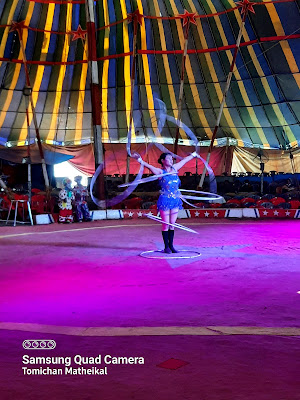Clowns on Trapezes
Maggie and I
went to watch Jumbo Circus yesterday. The shows – 3 daily – were going
on for a month and they were coming to an end in two days. “It’s a dying art,”
I told Maggie. “Let’s encourage the troupe by taking two front seat tickets.”
Maggie agreed. “Don’t expect much,” I warned her on the way.
The show didn’t
disappoint us though it had none of the glory that circuses had in yonder years.
There was no live band with scintillating music in the background. There were
no animals except a few birds and dogs. The entire troupe consisted of just about
a score artistes and a few backstage crew. All of them looked weary and
listless. Even when they tried to smile at the end of their performance, the
smiles came out warped. There wasn’t much to cheer them, I guess; most of the
chairs remained vacant in the huge tent.
The juggler missed his balls too often. The acrobats on cycles lost balance occasionally. The rest was as great as it could be in the given situation with a shrunken audience. The trapezes and the bikers in the globe were superlative. The clowns did their best though their motleys looked more worn out than the wearers themselves.
The viewers
clapped hands at the end of each performance. Maggie and I too contributed our
share of cheer to the performers who pretended to be cheerful. Circus is indeed
dying, I said to myself. But then, is it only circus that is dying in our world?
Long ago, I wrote a poem about a clown on a trapeze. This last circus I watched too had a clown on the trapeze for a moment. But all he did was to let himself be stripped of the loose pyjamas that he had put on over his trousers. That was a far cry from the antics of clowns that I was used to in earlier circuses. It is difficult to be a clown nowadays. Nevertheless, my old poem insists on swinging on my memory’s trapeze. Here it goes… as it appears in the anthology titled God’s Love Song (reminding me of my clown days).
PS. Tomorrow: weekly column, Media
Watch




Circus for the modern times will have to reinvent itself with focus on spectacular entertainment as done in the performances of by Cirque du Soleil.
ReplyDeleteIndeed circus in the old form is neither feasible nor charming now. They have to reinvent circus, true.
DeleteHari OM
ReplyDeleteIndeed, with the rise of the more acrobatic performance troupes as Rajeev mentions, these trad travelling troupes are archaic. Then again, what do these folk do, who have been born to it, very often, and know no other life... I very much enjoyed your poem. YAM xx
One can feel their helplessness just by observing them. I hope their lot improves.
DeleteThat poem was written in my youth when i was quite a blunderer.
I wonder what they all moved on to.
ReplyDeleteI visited your blog. Nice little stories you have there this season. I wonder why the site doesn't accept my comments.
DeleteI have never seen a circus. Although i have few novels about it. I think there was one by RK Narayan too. I seem to forget what it's name was but it also about a circus coming to town. It's sad to know that this art form is dying but such is time. One has to change with it or perish. I agree with the comments here that they should reinvent themselves. I hope they do. I enjoyed your poem.
ReplyDeleteCircus may not survive in the form I watched it now. Nowadays dancers are actually performing circus.
Delete